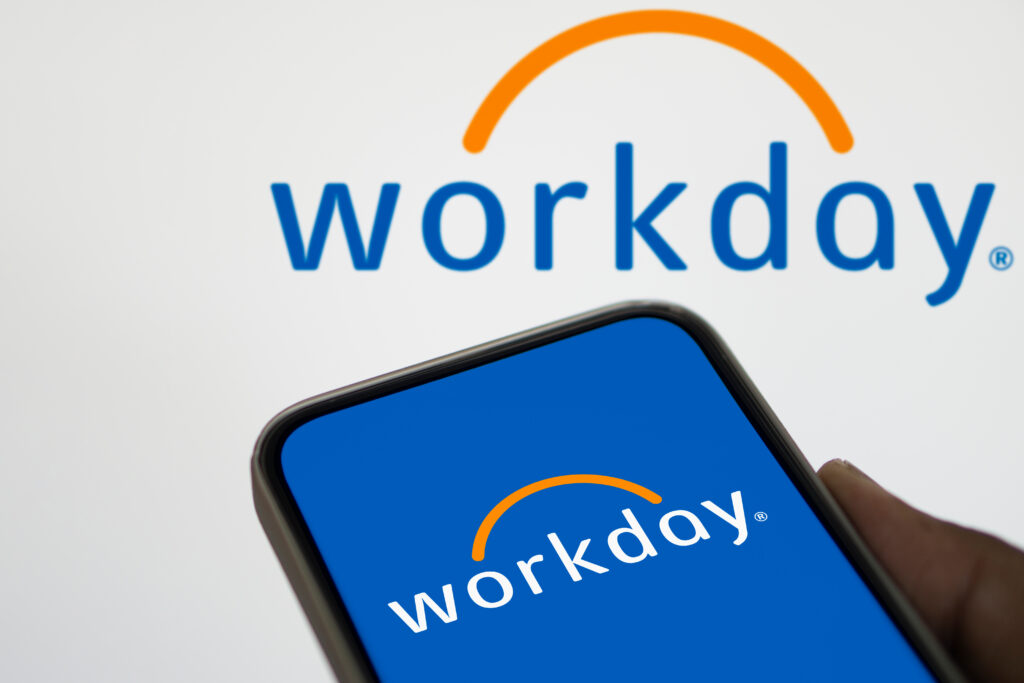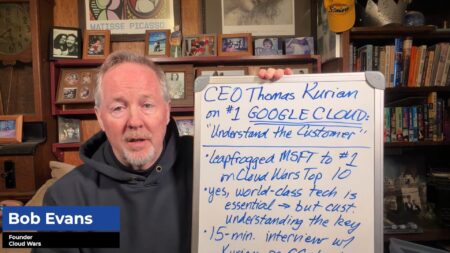
One of the core discussions around the rapidly evolving sector of agentic AI is governance. How do companies manage what can quickly become a sprawling ecosystem of AI agents? Workday’s answer to this challenge is the Workday Agent System of Record, a powerful tool for centrally managing agents from Workday and third parties.
At the recent Workday Innovation Summit, Cloud Wars founder Bob Evans caught up with Shane Luke, VP of AI & Machine Learning, Workday, and Ali Fuller, Senior Vice President of Experience, Workday, to learn more about this game-changing digital labor management platform.
Taming the AI Agent Ecosystem
Regarding AI agent management, Evans kicked off the discussion by asking the pair how Workday was helping to bring order to what is fast becoming a complex situation for its customers. “We believe it can be brought together — and that Workday is uniquely positioned to make it happen.” explains Luke.
“Workday excels at managing the human workforce,” he continues. “As agents are introduced, many of their characteristics are directly analogous to those we expect from human employees.” Luke likens AI training and tuning to onboarding and measuring value from an agent to measuring performance from an employee.
Fuller explains Workday’s approach to managing the agent ecosystem, “Workday is absolutely going to be providing these native agents, especially aligned to key personas that use Workday … but we’re not the only vendor producing agents, and we don’t think that we will be the only vendor adding agents to that ecosystem,” she says. The Workday System of Record, explains Fuller, needs to manage Workday native-built agents, customer-built agents, and agents developed by partners of those customers.
“We do believe people want one place to manage that proliferation of agents, and we think that Workday is uniquely suited to do that,” she concludes.
Key User Benefits
Fuller referenced a recent panel discussion where panellists from various C-suite roles shared their experiences as different buyer personas on the benefits of AI agent management with Workday.
“For a CIO, it’s really that management, that registration, that ability to see across agents and candidly deactivate them when you want to, when they’re doing things you don’t want them to do,” says Fuller. “Think of it as risk mitigation to some degree.”
“From a CFO perspective … they want to see their total workforce,” she continues. “Workday today manages your full-time employees, your contingent labor, and now your digital labor … Imagine you’re forecasting, planning, doing cost analysis, closing your books. Digital labor is now going to be a part of your cost allocation and your planning.
“If you can see all that together … you can absolutely better plan, execute, and analyze, not only on a quarterly [or] annual basis, but also have good line of sight to your costs and make sure that you’re meeting your goals as a business.”
This unified visibility transforms AI agents from isolated tools into strategic assets that are deeply integrated, accountable, and aligned with the business’s broader financial and operational goals.

AI Agent & Copilot Summit is an AI-first event to define opportunities, impact, and outcomes with Microsoft Copilot and agents. Building on its 2025 success, the 2026 event takes place March 17-19 in San Diego. Get more details.
The Rise of Role-Based Agents
Evans asks the pair to expand on the use of agents in other, role-specific areas, like cost containment, security and compliance, and performance management. Fuller explains that introducing role-based agents to tackle these areas requires change management and a mindset shift. Ultimately, she says, a company will be taking its workforce through an entire transformation, and that doesn’t happen overnight.
“As AI developers, we’ve traditionally built AI as features to solve specific problems,” says Luke. “Now, we’re shifting our mindset to view AI as a set of skills that operate within an organization. That shift enables us to meaningfully develop across the three key areas you mentioned.
“I think because of the nature of our business, which is really around people and money, typically what we see is there are roles … that full-time employees or contingent labor fill, and that’s actually how our customers think about leveraging digital labor,” adds Fuller. She explains how Workday’s role-based agents take tedious or repetitive tasks away from human operators, fostering a collaborative relationship between humans and agents.
Workday Extend for Agentic AI Development
Evans asks Fuller and Luke to explain how customers were using Workday Extend, the company’s low-code development suite, to accelerate their agentic AI ambitions. “Over the past few years, my team has partnered closely with the Extend team to launch what’s now known as the Workday AI Gateway, as part of Extend Pro,” says Luke. “We’re now building on that foundation with an Agent Gateway, enabling the use of agentic AI in various forms.”
Luke explains that discovering agentic AI development through Workday Extend is a great way for customers to dip their toes in the technology and get more comfortable with it, “It’s a very controlled environment,” he says. “You don’t have to worry about data risks.”
Ask Cloud Wars AI Agent about this analysis










